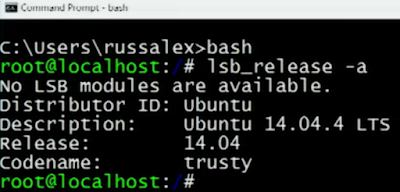Windows 10 to include Bash. Should you care? I don’t.
Microsoft has announced on March 30, 2016 at its annual Build Developer Conference that Windows 10, with the coming updates, will support bash commands.
Microsoft will support a Linux subsystem – not a virtual machine – based on Ubuntu 14:04 LTS.
Many people started wondering what the impact of this news will be.
For developers and power users, this is surely good news. For Average Joe, it won't change a thing, as Average Joe doesn't create bash scripts.
I think the current Microsoft CEO has taken important steps, opening Microsoft to the open-source world, as he realized Windows risks to become gradually irrelevant (see the Azure platform changes, for example).
The way Microsoft implements its proprietary solutions leaves much to be desired and people have started discovering open-source systems and Chromebooks.
A Chromebook is ideal if you just need a PC to surf the Internet, check your mail and edit documents. You can save on the Windows tax and get a much more secure operating system, as it's totally online-based.
Yes, Windows still rules in the desktop market, but for how long?
Bash support is a good thing.
However, introducing Bash shell without the UNIX or Linux kernel is like having a chair sitting on one leg.
It's not gonna cut it and we know the way Microsoft implements its software, in its proprietary and messy way.
What Microsoft promises to do involves challenging technical choices, such as implementing a fully POSIX-compliant layer, whereas Windows is only partly POSIX-compliant.
The use of backslashes for filepaths, for example, is something typical to Windows and totally outside of the POSIX standard. In fact, UNIX/Linux OSs use slashes for the filepath.
Will Microsoft have to implement two different filepath styles (Windows and UNIX)?
Will they be compatible, or will they cause further overlooked problems?
What Microsoft promises to do involves challenging technical choices, such as implementing a fully POSIX-compliant layer, whereas Windows is only partly POSIX-compliant.
The use of backslashes for filepaths, for example, is something typical to Windows and totally outside of the POSIX standard. In fact, UNIX/Linux OSs use slashes for the filepath.
Will Microsoft have to implement two different filepath styles (Windows and UNIX)?
Will they be compatible, or will they cause further overlooked problems?
We'll stand and see.
It'll be sure fun to test this update for you.
It promises to wreak a lot of havoc, under any meaning and I will review it as soon as it becomes available.
It promises to wreak a lot of havoc, under any meaning and I will review it as soon as it becomes available.
Though I'm curious, I think no half solution can replace a fully-fledged UNIX/Linux operating system.
I can't be productive on Windows, so I don't really care a whole lot.
Nothing Microsoft could do will impact my choices.
I do believe, though, this will end up favoring Linux more than Windows.
Time will tell.



Comments
Post a Comment